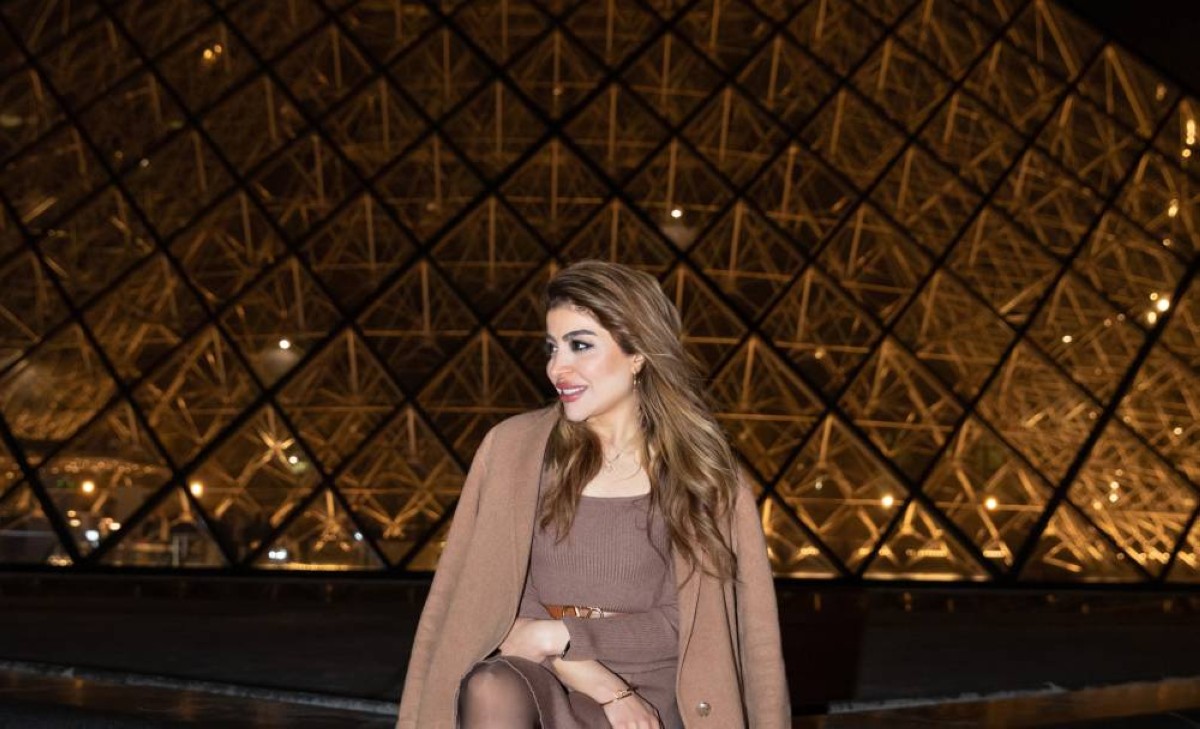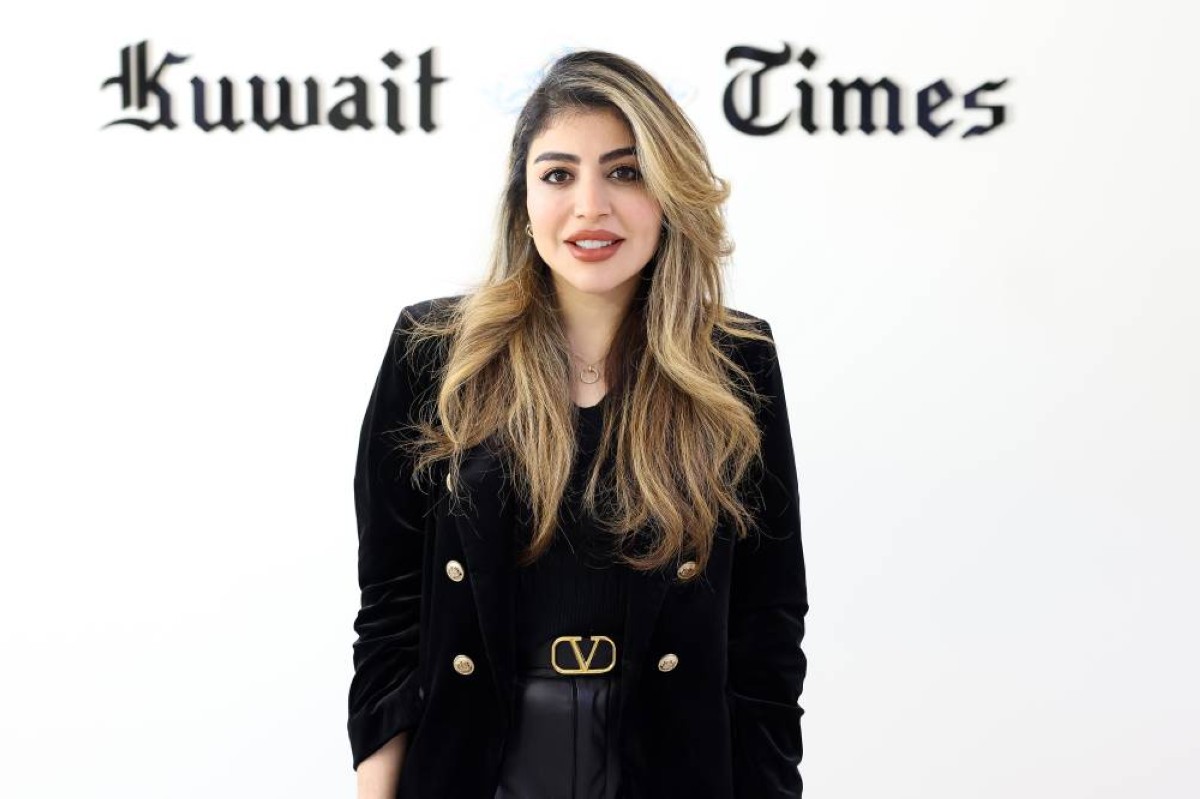Kuwaiti professor teaches the IM Luxe master*s program in France
In Kuwait, the perception of luxury is deeply intertwined with a rich cultural heritage and a contemporary flair for opulence. Kuwait Times spoke with Esraa Al-Shatti, a professor and researcher in luxury, to learn more.
Kuwait Times: Tell us more about yourself.
Dr Esraa: I grew up in a family that values education a lot, which made me realize how education can open up opportunities in life. I am very close to my parents, and luckily with the wisdom of my dad and the warmth of my mother, I understood from a young age my true passion and the direction of what I wanted to be. To me, teaching is the broader concept of education, because through teaching, I’m being engaged in a two-way process that involves a learner and me as an educator, and through creating content, preparing the subjects and sharing this knowledge and concepts, of course I am learning every day. I moved to Paris in 2017 to continue my graduate studies and that’s where all it started.
KT: When did you show interest in exploring luxury brands?
Dr Esraa: As I am coming from Kuwait, I think we pay attention to details and have an eye for beauty.When I moved to Paris, I saw that I was craving something beyond education.Every walk I took in the heart of Paris was telling me a story, the buildings,streets, the culture, museums, the fashion houses — there was something ineffable. The charm of the City of Light made me realize that I needed to learn something more than just fashion and aesthetics; the fundamental nobility of luxury and the profound history that I wanted to explore and take this field to the next level.




KT: Tell us more about your career background?
Dr Esraa: My academic career started in the 2019 fall semester. I was teaching EM-Normandie Business School Master 2 students, right after the COVID-19 pandemic. In 2021, I returned to Kuwait and started teaching at Gulf University for Sciences and Technology (GUST). Dreams do come true, and in 2023, I got selected to teach at the international luxury management master’s program in France. I focused on where I come from — the luxury market in the GCC.
KT: Who inspired you?
Dr Esraa: I get my inspiration from a lot of things; I am constantly learning new things and falling in love with beauty all the time! Especially in artists, and I appreciate details that tell stories, but I believe that education complements everything we do. When it comes to luxury, I believe the inspiration came from Paris, and being an active researcher, it made me recognize that this field is booming in the GCC, which led me to discover the luxury industry and dive into fashion houses.
KT: Can you share your insights into the intricate world of luxury and how your second PhD contributes to your expertise in this field?
Dr Esraa: Luxury does not have a universal definition; the concept is related to both time and person. For example, what used to be a luxury in one generation may be a necessity for a newer generation. For centuries, luxury focused on artisan production, craftsmanship, unique design and super-quality materials. My main topic of expertise is impression management (IM). According to Canadian Sociologist Erving Goffman, IM is the tendency to behave in a certain way to control how others perceive you. Building on my initial research, I was eager to see how luxury consumption is positively correlated to impression management. In other words, are people buying luxury products/services to indulge in the luxury experience or to show off?
As we all know in the old days, accessibility was limited and luxury was created for a certain type of people like the nobles and the elites of their time. Nowadays, individuals have the purchasing power and the desire to spend on products/services that might not be necessary but provide prestige, elegance and social status, which is increasing tremendously with the prevalence of social media. This sector is gaining incredible visibility in our societies. The competition starts with the people in the society before the brands themselves.
Another important point is that individuals in Kuwait and GCC are considered high net worth individuals (HNWIs), and the society’s way of showing status. The global luxury market is worth €1.5 trillion, and the GCC luxury market’s value is $11 billion, which makes luxury retail one of the leaders in contributing to a country’s economy. The reason why understanding the key drivers of the luxury market on an international scale is mandatory is that fashion houses and brands follow specific strategies. Therefore, during my life abroad and meeting with professionals who have been in the field for years, I learned that the luxury industry is a challenging and trending field. You cannot thrive if passion and creativity are not part of your personality.
KT: As a professor teaching in the International Master’s Program in Luxury Management, how do you approach educating students about the unique challenges and nuances of managing luxury brands in an international context?
Dr Esraa: In my point of view, life with education can erase challenges, because if you have the knowledge and skills, you will deal with all situations in life in the best manner. I also believe challenges are in every sector and industry. First, educating students about the industry as a whole from all its facets. The GCC market is rising rapidly and coming from this region made me extend my research; thus students in this program have more knowledge and real-life cases in this field. Also, working on projects as a team gives students insight and exposure to the current market trends to be prepared for the workplace.
KT: How do you integrate your knowledge and research into your teaching methodologies for this prestigious dual-degree program?
Dr Esraa: Being active in both research and the field of luxury gives me strengths in delivering the right information and directing them toward using the right methods to get their dream job. I make sure that students understand the concepts and topics clearly. I also put them in contact with experts in the field, whether through seminars, projects, luxury house visits or case studies. Students mainly join this program to excel in the field of luxury, as both France and Italy are pioneers in fashion and luxury. I am proud to demonstrate my experience and information when it comes to data collection or even real-life experience, as my mentors and professors worked with me closely to reach this point at a young age.
KT: Could you highlight some trends in the luxury industry that you find particularly critical for professionals entering this field to understand?
Dr Esraa: Understanding generational and market nuances is needed to excel in the luxury field, especially since the new generation is always seeking more and they’re well connected to social media platforms and technology in general. Direct selling and clienteling are on trend, especially if you combine it with a unique personalized experience. The second-hand market revenue is expected to grow by 20 percent, according to Bain & Co.
KT: Tell us more about the dual-degree program between NEOMA Business School in Reims and Polimi Graduate School of Management in Milan.
Dr Esraa: The curriculum of the program concentrates on how to understand, create and manage value and build executive skills in the luxury sector.
KT: In your role as a content creator for Kuwait Times and Kuwait News on social media, how do you bring attention to the world of luxury brands and contribute to public understanding of this sector?
Dr Esraa: Passion is what led me to create videos that tell stories about the history of luxury brands, from creation to market value, as well as the recent news in the industry that I believe are new to the audience. Being aware of how my society loves luxury brands from all sectors gave me insight into telling them stories of intensive research I have done based on reliable sources about luxury brands and fashion houses.
KT: What advice would you give to students aspiring to excel in this dynamic and prestigious field?
Dr Esraa: My advice is if you have passion and interest in this field, you will enjoy every part of your journey. My advice is to join one of the master’s programs in this field to grow your knowledge and understanding of the luxury industry, because this is going to give you exceptional experience and learning methods from both academics and professionals in the field. As a result, you will get your dream job in one of the prestigious luxury brands.
KT: How do you see the luxury market faring in the GCC?
Dr Esraa: The luxury market in the GCC is growing rapidly, with a focus on high-end fashion and lifestyle products. The Gulf region is home to some of the world’s most wealthy consumers, who have a strong appetite for luxury goods. Therefore, paying attention to this industry can increase the economic growth of the country. The luxury market in the GCC is expected to grow annually by 3.57 percent (compound annual growth rate 2023 – 2028).

